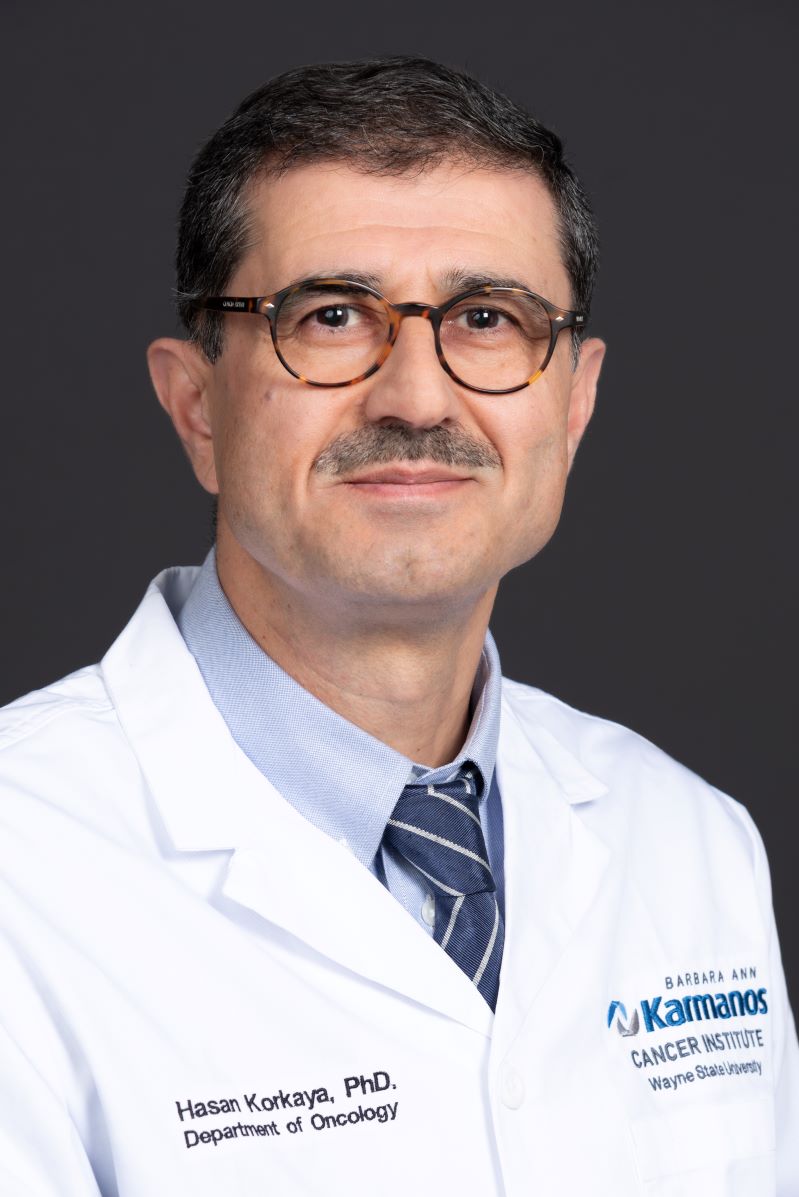Hasan Korkaya
Associate Professor
Basic Science
Office location
Karmanos Cancer Institute
Hudson-Webber Cancer Research Center - 731
4100 John R.
Detroit, MI 48201
Mailing address
Karmanos Cancer Institute
4100 John R., HW07AO
Detroit, MI 48201
Office phone
313-576-8264
Education training
Education:
(1999 - 2002) PhD, Molecular Biology, joint program by International Center for Genetic Engineering and Biotechnology (ICGEB) and Jawaharlal Nehru University, New Delhi, India
(1996 - 1998) MSc, Biotechnology, Jawaharlal Nehru University, New Delhi, India
(1988 - 1993) DVM, Veterinary Medicine, Istanbul University, School of veterinary Medicine, Istanbul, Turkey
Postgraduate Training:
(2006 - 2008) Research Fellow-University of Michigan Medical School, Internal Medicine, Division of Hem/Onc
(2002 - 2005) Postdoctoral Fellow, Van Andel Research Institute, Grand Rapids, MI
Professional experience
Faculty Appointments:
(2023 - Present) Associate Professor - Department of Oncology, Wayne State University School of Medicine, Detroit, MI
(2020 - 2023) Associate Professor– Augusta University, Medical College of Georgia, Department of Biochemistry and Molecular Biology, Full Member, Georgia Cancer Center
(2013 - 2020) Assistant Professor– Augusta University, Medical College of Georgia, Department of Biochemistry and Molecular Biology, Full Member, Georgia Cancer Center
Hospital or Other Professional Appointments:
(2023 - Present) Co-Leader, Tumor Biology Microenvironment, Department of Oncology, Wayne State University School of Medicine, Detroit, MI
(2012 - 2013) Research Assistant Professor-University of Michigan Medical School, Internal Medicine, Division of Hem/Onc
(2009 - 2011) Research Investigator-University of Michigan Medical School, Internal Medicine, Division of Hem/Onc
(2006 - 2008)Research Fellow-University of Michigan Medical School, Internal Medicine, Division of Hem/Onc
(2002 - 2005) Postdoctoral Fellow, Van Andel Research Institute, Grand Rapids, MI
Major professional societies
(2006 - Present) Turkish Biochemical Society (Adhering Body to International Union of Biochemistry and Molecular Biology (IUMBM).
(2010 - Present) American Association for Cancer Research-AACR (Elected Member)
(2019 - Present) Society for Immunotherapy of Cancer (SITC)
Honors and awards
(2009) AACR-Susan G. Komen Scholar-in-Training Award
(2002 - 2005) A post-doctoral fellowship awarded by the Van Andel Research Institute
(1996 - 2002) A “PhD fellowship” by the United Nations’ International Center for Genetic Engineering Biotechnology (ICGEB). Monthly stipend provided during the curse of graduate studies.
(2000) “Certificate of Excellence for outstanding contribution to hepatitis research” received at the 10th International Symposium on Viral Hepatitis and Liver Disease, Atlanta, GA
(2000) “Travel Fellowship” by the International Conference on Molecular Epidemiology and Evolutionary Genetics of Infectious Diseases, Hyderabad, India
Research
Tumor cell plasticity: It is now widely believed that cancers are driven by a subset of cells called cancer stem cells (CSCs) or tumor-initiating cells (TICs) that mediate metastasis, recurrence and treatment resistance. However, the emerging evidence suggested that the plasticity of CSCs between the EMT and MET phenotype has been associated with aggressive/metastatic property of solid tumors. One of the projects in the Korkaya lab aims to understand the spatiotemporal regulation of the CSC plasticity and identify critical players in these processes.
Tumor microenvironment and pre-metastatic niche: Although, the role of immunosuppressive TME/pre-metastatic niche in disease progression and treatment response has been well recognized, the molecular mechanisms that regulate these processes remain elusive. Preclinical and clinical data provide some evidence that immune cells of myeloid origin (macrophages, neutrophils, MDSCs) are major components of the TME and may play role in resistance to ICIs. A recently funded project in the Korkaya lab aims to dissect the molecular mechanism by which stress-induced HSP70 regulates both protection of tumor cells from cytotoxic agents (including CTLs) by regulating the CSC plasticity and generates an immunosuppressive TME/pre-metastatic niche via the modulation of immunosuppressive myeloid cells. The team aims to investigate whether targeting HSP70 using the new generation allosteric inhibitors will sensitize tumor cells to standard of care including the ICIs and induce immune-stimulatory cells within the TME/pre-metastatic niche to activate effector T cells.
Additional research interests include:
1. Development of patient-derived xenografts (PDXs) and organoids
2. Syngeneic mouse models and their utility in determining the efficacy of ICIs
3. Development of the tumor dormancy models
4. Mechanisms of therapeutic resistance
Research interests
Research in the Korkaya lab focuses on the understanding of the early molecular events during the metastatic cascade. Unfortunately, women with metastatic disease have limited treatment options and shorter lifespans compared to those with indolent tumors. Current understanding of the metastatic process suggests that successful metastatic colonization in distant organs requires disseminated mesenchymal stem cells (EMT/CSC) to revert back to the epithelial phenotype (MET/CSC) via mesenchymal-epithelial-transition (MET). Ongoing research in the Korkaya lab provided some evidence that these processes might be regulated by the cross-communication between the tumor cells and immunosuppressive myeloid cells within the tumor microenvironment (TME) and premetastatic niches. The major focus going forward will be to identify key molecular players in each stage of the metastatic cascade and testing their therapeutic utility in preclinical settings.
